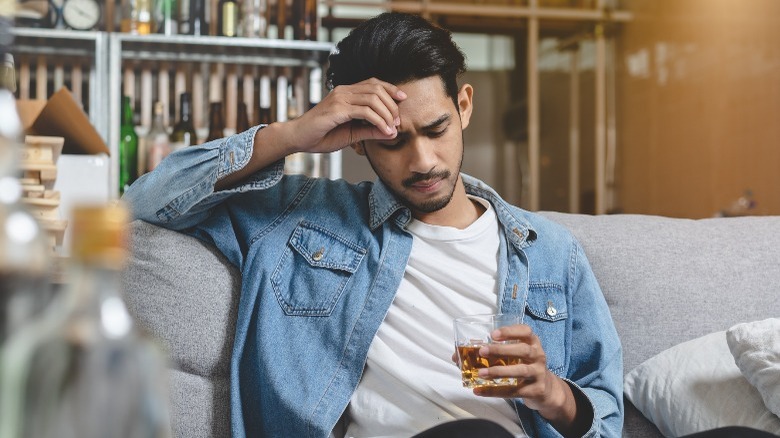Binge Drinking On Weekends May Seem Harmless, But Experts Warn Against It
You may think binge drinking once in a while is no big deal. YOLO, right? However, according to a new study, even if you only binge drink on weekends, you could end up suffering from alcohol-related health issues in the long term, per U.S. News & World Report.
Binge drinking is defined as consuming five or more alcoholic drinks during a single event. Based on this, the study's findings indicate that occasional binge drinking could lead people who typically consume moderate amounts of alcohol to develop a tolerance, ultimately creating an urge to consume more alcohol to deliver the same effects. The results of the study, published in the American Journal of Preventive Medicine, are based on survey responses of roughly 1,200 Americans over the age of 30. Of the 1,100 participants who were defined as moderate drinkers, 7% reported having alcohol problems when they were first surveyed and 12% reported issues when they were surveyed again nine years later, per U.S. News & World Report.
Lead researcher Charles Holahan, a professor of psychology at the University of Texas at Austin, told U.S. News & World Report that typical research on binge drinking has focused on people in their teens and early 20s. However, most binge drinking actually occurs in the older than 30 population.
The real dangers of binge drinking
According to the experts at the Centers for Disease Control and Prevention, binge drinking is a serious issue in the United States. One in four Americans binge-drinks weekly, consuming an average of eight drinks. Binge drinking comes with a whole host of health risks including heart disease, cancer, injuries due to falls and motor vehicle crashes, unsafe sexual behaviors, and memory problems, among others. Binge drinking can also lead to violent acts against another or oneself.
Alcohol affects people in different ways, but there are clear signs when alcohol consumption is negatively impacting your life. For one, you may notice that you are having issues at work or at home more frequently. More specifically, signs that binge drinking is causing issues include drinking often and early in the day, feeling shaky or weak when you go without a drink, swapping out your favorite activities for drinking, and defensiveness about your drinking, per WebMD.
To prevent the risk of becoming a binge drinker, the experts at WebMD advise slowing down and consuming food while drinking. Also, be mindful of the recommended limits: women should have no more than an average of one drink per day and men no more than two. You can also ask your doctor for tips. However, if you or someone else has a substance abuse problem, it may be time to seek treatment options, per National Institute on Alcohol Abuse and Alcoholism.
If you or anyone you know is struggling with addiction issues, help is available. Visit the Substance Abuse and Mental Health Services Administration website or contact SAMHSA's National Helpline at 1-800-662-HELP (4357).


